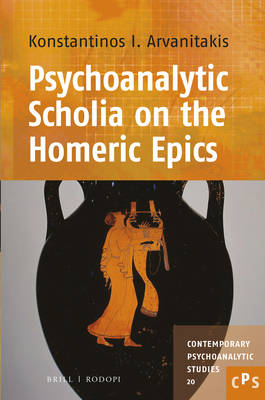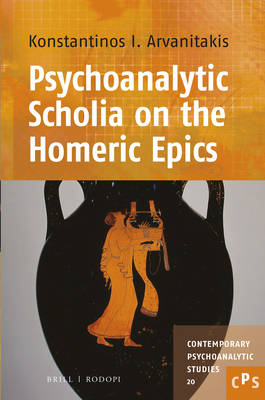
- Retrait gratuit dans votre magasin Club
- 7.000.000 titres dans notre catalogue
- Payer en toute sécurité
- Toujours un magasin près de chez vous
- Retrait gratuit dans votre magasin Club
- 7.000.0000 titres dans notre catalogue
- Payer en toute sécurité
- Toujours un magasin près de chez vous
Description
This work attempts a psychoanalytic listening to the 'oral' Homeric epics in an effort to extract, as it were, from the ancient text certain elements of psychoanalytic understanding that are of relevance to contemporary psychoanalysis. There is, in addition, a consideration of related philosophical and linguistic issues that are linked to the basic psychoanalytic concepts that emerge from such a listening.
The main themes treated rotate around the central axis of time as it is expressed in the Homeric epics. Thus, questions of transition, loss, mourning, tolerance, identity, metaphor and tragic fragmentation are addressed as they relate to the ancient text. The process of metabasis along contrasting psychic states of being is discussed as it provides the frame for the construction of the basic interval of time and of the flux of human identity.
Although psychoanalysis from its early beginnings has shown - largely owing to Freud's positing the Oedipus complex as the nuclear conflict - a distinct interest in classical Antiquity, the area of the great Homeric Epics has been singularly neglected as a chosen focus of psychoanalytic attention. It is as if the Homeric Epics belonged to a prehistoric pre-oedipal world which, for a long time, was not the dominant concern of psychoanalysis. The merit of this book lies in the fact that it fills part of this lacuna in psychoanalytic studies.
The main themes treated rotate around the central axis of time as it is expressed in the Homeric epics. Thus, questions of transition, loss, mourning, tolerance, identity, metaphor and tragic fragmentation are addressed as they relate to the ancient text. The process of metabasis along contrasting psychic states of being is discussed as it provides the frame for the construction of the basic interval of time and of the flux of human identity.
Although psychoanalysis from its early beginnings has shown - largely owing to Freud's positing the Oedipus complex as the nuclear conflict - a distinct interest in classical Antiquity, the area of the great Homeric Epics has been singularly neglected as a chosen focus of psychoanalytic attention. It is as if the Homeric Epics belonged to a prehistoric pre-oedipal world which, for a long time, was not the dominant concern of psychoanalysis. The merit of this book lies in the fact that it fills part of this lacuna in psychoanalytic studies.
Spécifications
Parties prenantes
- Auteur(s) :
- Editeur:
Contenu
- Nombre de pages :
- 122
- Langue:
- Anglais
- Collection :
- Tome:
- n° 20
Caractéristiques
- EAN:
- 9789042039278
- Date de parution :
- 02-04-15
- Format:
- Livre broché
- Format numérique:
- Trade paperback (VS)
- Dimensions :
- 152 mm x 231 mm
- Poids :
- 294 g

Les avis
Nous publions uniquement les avis qui respectent les conditions requises. Consultez nos conditions pour les avis.






